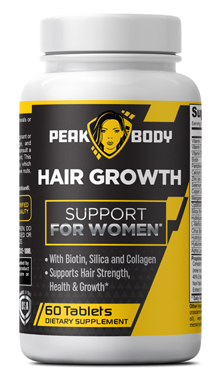- Mfr: PeakBody
- Daily
- Your Price(US Dollars)
$
PeakBody Hair Growth for Women
Our PeakBody natural hair growth treatment supplement designed specific for women, contains cutting edge ingredients including: Biotin 5000mcg, Vitamin C 400 mcg, OptiMSM 250 mg and 367 mg propriatary blend of natural herbals formulated for women.




Treatment for the Growth of Womens Hair
Thirty million women in the United States are dealing with hair loss, as stated by the American Academy of Dermatology.
That is an astounding amount, and a significant number of women are likely looking for explanations.
You have arrived at the proper location if you are one of those women. This article will discuss the most effective therapies for womens hair loss, such as dietary modifications, vitamins, and natural supplements.
Treatments for Hair Loss: Vitamins and Minerals
Vitamin B-12: This vitamin is necessary for the growth and regeneration of cellular tissue. Beef, eggs, and chicken are all good sources of vitamin B-12 in the diet. Consider using a dietary supplement.
Anemia is a prevalent factor in the development of hair loss, and a deficiency in vitamin B-12 might contribute to its development.
Iron is another nutrient necessary for the growth and regeneration of cells. It is also essential for transporting oxygen to the cells in the body. Anemia, which is a prevalent factor in hair loss, is caused by a deficiency in iron.
Foods such as red meat, dark leafy greens, legumes, and cereals fortified with iron are examples of iron-rich foods. In addition to that, you could take an iron supplement.
Omega-3 Fatty Acids
These beneficial fats are essential for various reasons, including ensuring that the skin and hair remain healthy. Salmon, walnuts, avocados, and foods made with flaxseed oil are examples of foods that are high in omega-3 fatty acids. In addition to that, you might take an omega-3 supplement.
Diet to Treat Hair Loss
Alterations to Ones Diet May Help Treat Hair Loss. Zinc is a mineral that plays a significant role in developing new cells, functioning the immune system, and treating wounds. The loss of hair and zinc deficiency.
Oysters, beef, pumpkin seeds, cashews, and chickpeas are all foods high in mineral zinc. There is also the option of taking a zinc supplement.
Can Protein Spur Hair Growth
Protein is necessary for the repair and growth of cells and is important to their survival. Meat, poultry, fish, eggs, dairy products, legumes, and nuts are some foods that provide a significant amount of protein. Hair loss and a protein deficiency.
Various Treatments Available for Female Pattern Baldness
A variety of therapies are available for ladies experiencing hair loss. Among these include dietary supplements such as vitamins B-12 and iron, changes to dietary habits such as increasing the amount of zinc and protein consumed, and therapies such as minoxidil ( Rogaine).
Have a conversation with one of our medical professionals about the treatment or combination of treatments that would work best for you.
Case Studies Concerning Female Pattern Baldness
The female pattern hair loss that affects so many women is the most common kind of alopecia (FPHL). Vulnerable women may struggle both emotionally and socially as a result of this situation.
Treatments are more successful in preventing more hair loss and reversing the effects of the disorder than simply changing the condition itself. Therefore, receiving a diagnosis and treatment at an early stage is desirable.
In most cases, confirming a diagnosis of FPHL requires nothing more than looking at the patients medical history and performing a physical exam on them.
However, the diagnostic utility of a scalp biopsy test has been called into question. Women who exhibit hyperandrogenism should undergo testing to determine whether they have ovarian or adrenal issues.
There are myths around the therapy of FPHL. When treating FPHL, one of the potential goals may be to stop the gradual shrinkage of hair follicles from continuing, while another objective may be to reverse this process.
Mild to Severe FPHL
The topical application of minoxidil and oral antiandrogen medicines (cyproterone acetate and spironolactone) are both effective therapies for mild to moderate female pattern hair loss (FPHL) in women.
With the help of the available drug treatments, most individuals with mild to severe FPHL can halt the condition from worsening and even reverse the shrinking of their lungs.
Reports of severe female pattern hair loss are associated with FPHL. Some women may require hair replacement procedures or surgery.



